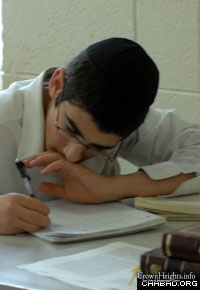
Students Pen Rigorous Essays on Scholarly Jewish Texts
When students at Chabad-Lubavitch rabbinical academies delve into their rigorous scholarly study of Jewish texts, they do so with the knowledge that they have been encouraged to pen their scholarly papers and insights for publication in journals that may be read by students and rabbinic scholars around the world.
Every year, from Baltimore, Md., to Manchester, U.K., from Holon, Israel to Moscow, Russia, tens of publications authored by students are published by the student bodies of their schools. These include in-depth analyses of Biblical verses, Talmudic passages, Jewish law and Chassidic texts. One publication from Yeshivas Lubavitch Manchester, for example, contains 47 essays, ranging in length from one or two pages to essays up to 20 pages in length.
Debating Jewish texts is almost as old as Judaism itself, and the recording of scholarly opinions on the texts has proliferated since the arrival of the printing press. The understanding has always been that any scholarly discussion is welcome as long as it is well-considered and well-sourced, and does not contradict established Jewish law.
Although scholarly Jewish volumes flourished in the late-20th century with the efficiency offered by modern methods of printing, scholarly publications continued to be the province of older scholars, established rabbinic figures and the top learners among university-aged yeshiva students, said Rabbi Moshe Kolodny, a historian of Jewish scholarship and archivist of the Agudath Israel Archive, “the top students in [such schools, as the] Slabodka Yeshivah published journals, but younger students never published anything.”
Similar publications were produced by the Tomchcei Tmimim Lubavitch Yeshivah in Warsaw – in prewar Poland – which published the Hatamim journal, edited by Rabbi Menachem M. Schneerson, the future seventh Chabad-Lubavitch Rebbe.
The Rebbe, of righteous memory, felt it was valuable that students of all ages diligently work on developing novel ideas and eventually see them in print.
“When the students are impressed that they should debate amongst themselves and come up with novel concepts,” the Rebbe told Rabbi Yissachar Dov Rokeach, the leader of the Belz Hassidic dynasty in 1981, “this gives the student a greater enthusiasm in the learning.” Moreover, knowing that his work will be printed will also emphasize to the student the importance of his adequately delving into and understanding the Jewish texts.
The Rebbe noted that even though the students may not truly understand the concepts to the degree that older scholars might – and their ideas might contradict the accepted understanding – it is still important “for the students to be animated with the text.”

From the Talmud to the Esoteric
In private correspondence with editors of these publications, the Rebbe insisted that there be peer review, and that only quality essays should be accepted. The Rebbe also wanted the publications to be issued several times a year, and that the printing itself should be high quality.
Following the Rebbe’s directive, student publications proliferated and their numbers increased each year. On his part, the Rebbe would at times, during public talks, respond to young students’ questions, and encouraged students in their writings by responding to questions they submitted on his scholarly talks.
Kolodny noted that today yeshivas around the world are encouraging their students to engage in scholarly writing and are at times publishing their work in booklets and more formal journals.
In a publication issued by the Rabbinical College of Quebec, Canada, a writer discusses the question: In cases where it is permitted for a person to send an envoy to do a mitzvah, or commandment, on his behalf, is it still better for the person do it himself? The writer cites rulings from the laws of preparing for Shabbat and from the laws of Passover in an attempt to prove that in all cases it is better for the person to do the mitzvah himself, rather than send an envoy to do it for him.
“If someone has novel ideas on Jewish texts he has to write them,” says Rabbi Menachem Mendel Schneebalg, a leading rabbinic figure in Manchester, U.K. “My heart was gladdened when I saw the publication from the Chabad students of our city who delve into and are diligent in their studying.” As a result, he called on the scholarly community to contribute to the Chabad-Lubavitch school’s publication. “I encourage you to join this great project and to contribute to the honor of Jewish teachings,” he writes.
In most schools the booklets are published several times a year, and in some they even appear biweekly, creating a lively debate on Jewish topics that at times can span over many issues. Rabbi Gavriel Zinner, author of more than two dozen volumes on Jewish law writes in one of his volumes that he regrets not receiving “every one of these important scholarly publications,” and that he misses reading much of the constant debates in the issues.
Debating Jewish law and Talmudic texts has always been more accepted than discussing Kabbalistic concepts as they are expounded in Chassidic texts. This was usually delegated to the leaders of their respective movements. The Rebbe, however, encouraged the students to write essays on the Chassidic teachings too.
In the Yeshivas Lubavitch of Baltimore publication, student Mendel Tubul writes a lengthy exposition on how the soul gives life to the body. Are the soul and the body two separate entities or do they unite to create the living body as we know it? In more than 15 pages, the student quotes tens of sources and different explanations to understand how Chabad philosophy understands the connection between body and soul.
The Rebbe wrote in a 1960 letter that if one is learning the texts of Chassidism, “for one or two years, and sometimes more, there needs to be an understanding and grasp of the text in order for them to be able to explain it also to others orally and in writing.” The Rebbe continued that “when the students write about a certain topic, one could see the students’ enthusiasm for the subject and this also excites his friends. It also forces the student to delve into greater understanding of the topic.”
















So proud
So proud of the Baltimore Yeshiva – It’s amazing how diligent they are in publishing 3 times a year the bochurim’s insights. Yashir Koach !!